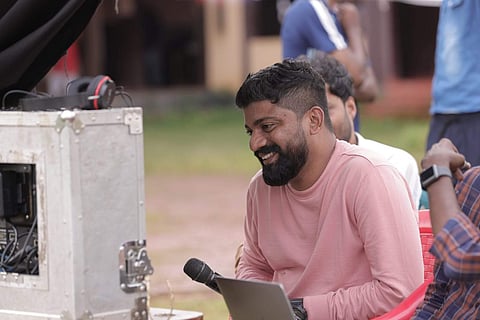

For a film starring Arjun Ashokan, Anaswara Rajan and Mamitha Baiju, 'presented' by filmmaker Martin Prakkat no less, one would expect Pranaya Vilasam to accompany with a certain level of fanfare. Fortunately, the overall response has turned out to be predominantly positive. The film's director, debutant Nikhil Murali, believes more in the power of word-of-mouth than aggressive promotions. "We did the best to promote it the way we could, considering the limited budget and the size of the film, and pinned our hopes on the content, which we believed to be fairly strong. I guess the way the film is performing now speaks for itself."
Speaking of the promos, the very few they had, Nikhil was careful not to give anything away. He found inspiration in the trailers of films like Sudani from Nigeria and Jan-e-Man. "What I found so interesting about them is that they don't take away the fun of discovery. People like surprises. We should reserve the fun part for the theatre experience."
The "fun" referred to here is the film's midway detour to the 90s -- to focus on two significant characters' past -- without causing tone fatigue, thanks to the witty banter between a father and son (Manoj KU and Arjun Ashokan, respectively), which evens out the slightly heavier past portions. "It was a form that we got to without planning in advance," says Nikhil. "It all happened organically. Since it was my first film, I wanted to do it without causing much loss to the producers. The intention was to do it honestly -- to do justice to the story and characters. If we set out to make something with pure intentions, everything else will automatically fall into place."
Nikhil was working as an ad filmmaker when writers Sunu AV and Jyotish M approached him with the idea of Pranaya Vilasam. "It was a small idea, which I liked because it was closer to some of the ideas I wanted to explore," he says. The script was completed in six months and pitched to producers Siby Chavara and Renjith Nair, along with Martin Prakkat, of course.
The team also convinced Arjun Ashokan, who was immediately on board. "Arjun joined first, followed by Anaswara and Mamitha. That these three were in Super Sharanya hit me only after others mentioned it," he laughs, recalling the decision to cast Arjun after being impressed with the actor's performance in June. "He is a genuine and cooperative guy, and we can see that in his interactions with people around him; he has this innate charm that worked really well for the film. He did his work with zero complaints. The same goes for everyone else on the team. It was a chill, tension-free atmosphere on the sets."
One of Pranaya Vilasam's high points is Hakkim Shah's casting as Vinod, the former flame of Arjun Ashokan's mother, played by Sreedhanya. Hakkim appears in two makeovers, one of which is convincingly age-appropriate. "We were all confident about casting Hakkim, aside from his makeover working out well," says Nikhil, who envisioned Vinod with the body language of some of the guys in his hometown.
Asked if they considered doing a similar casting for Sreedhanya's character, Nikhil says the team didn't take that risk considering the believability factor. "During scripting, we had thought of different names, but different production houses have their own ideas for the kind of cast they want; they would prefer a certain set of actors. As for our current producers, we reached an understanding of the actors we wanted. Casting a different person as Arjun's mother would've been challenging because finding someone resembling Anaswara is tough. We cast Sreedhanya, ma'am, after seeing an ad she did with Anaswara. I realised that they both looked similar. She was in Mumbai for a long time, and she not only took the effort to get to Kerala but also understand the dialect and language."
Nikhil also found a more sensible way to depict the flashbacks, opting for a 90s setting, keeping in mind the main characters' age groups ranging from the 20s to middle age. "Malayalam cinema hasn't shown the 90s much. It's usually the 80s whenever we think of past segments. But it wouldn't make sense anymore. When we did our research, we slowly realised that Malayalam cinema rarely revisited the 90s. Besides, it's less complicated because there are no major differences between the aesthetic of today and then -- aside from updated vehicles, television sets, and mobile phones, of course. We thought people would find that aesthetic easier to connect than something preceding it."